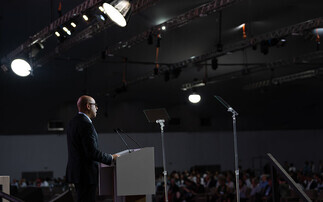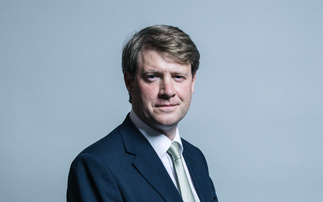The next London mayor will have the power to put rocket boosters under the entire UK's green economy - here are 10 proposals that could turn the capital into a low carbon powerhouse
What do green businesses want from the next London Mayor? That was the question tackled at a fascinating event hosted by the Aldersgate Group last week that I was lucky enough to chair. And coincidentally it is one of the questions I've been asked to consider ahead of a meeting of the London Assembly's Environment Committee this Wednesday that I'll be taking part in.
It is a not inconsequential question. Rightly or wrongly London remains the UK's primary economic engine and as such is also disproportionately important to the health of the country's green economy. Moreover, the Mayor is in many regards a more powerful politician than the vast majority of the cabinet, boasting control over a host of planning, housing, transport, health, policing and environmental policies, not to mention a £17bn budget. A mayor unequivocally committed to turning Europe's only mega-city into one of the world's greenest metropolises would have a huge impact on the prospects for hundreds if not thousands of green businesses.
But in a mayoral race where all the leading candidates appear to be in complete agreement on the need for ambitious environmental policies what specific policies and projects does the green business community need from the next resident of City Hall, be it the Conservative MP and former editor of the Ecologist or the Labour MP who wants to be the greenest mayor London has ever had?
The Aldersgate Group event and its expert panel put forward a raft of suggestions the next mayor should consider and the group will soon be putting together some specific green business asks for the next mayor on behalf of its members. However, below are 10 ideas that caught my imagination and could really help secure London a position as a green business hub following eight years under Mayor Boris that have seen encouraging environmental progress repeatedly undermined by inadequate action on air pollution and occasional column-filling flirtations with climate sceptics.
1. Create Europe's premier clean tech cluster
The keynote address last week was delivered by former climate change minister and chair of the London Sustainable Development Commission, Lord Barker, who revealed one of his priorities for the new Mayor was the creation of a genuinely world-leading clean tech hub in West London at the site of the giant Old Oak Common development. For Barker, the proximity of Imperial College's new campus and the imminent HS2 link make the site the perfect location for repeating the success of Silicon Roundabout, only this time with clean tech instead of digital innovation, and in West London instead of East.
Whether clusters are consciously made by politicians or successfully nurtured once a combination of geographical, social, and commercial factors have inadvertently created an industrial hub is still open to debate, as is the suitability of West London for an entirely new clean tech cluster. Some will argue it is better to build on fledgling existing clean tech hubs around London Bridge, Canary Wharf, and (further afield) the Cambridge corridor, than start from scratch.
But whatever the new Mayor decides Lord Barker's core contention remains valid; technology clusters accelerate commercial development and act as invaluable crucibles for R&D and entrepreneurship. The new Mayor should do everything in their power to deliver a large-scale London clean tech cluster, and then use their unique platform to sing its praises around the world.
2. Make all new roofs green roofs
One of the biggest policy levers the Mayor has is over planning and the opportunity to require all new developments to feature the latest green innovations should not be passed up. London will never claim the title of one of the world's greenest cities if it does not ensure all its new buildings are built to the highest environmental standards. The government's short-sighted decision to scrap zero carbon building rules on spurious cost grounds and its continued failure to support wider adoption of Merton Rule style renewable energy requirements creates an opportunity for the new Mayor to set London apart from the rest of the UK when it comes to green building codes.
Claudine Blamey, head of sustainability and stewardship at Crown Estate, which has pioneered the use of green roofs on its West End estate, said there was the potential to make every new roof a green roof and transform the city's biodiversity in the process. A similar argument can be made for installing rooftop solar arrays on all new buildings.
The argument against such policies always boils down to concerns about costs in a city where property prices are already stratospheric. But as Duncan Price, director of sustainability at BuroHappold Engineering, argued, when land values are as high as they are in London it should, in some ways, become easier to justify investment in the latest technology. Moreover, it is about time a top politician recognised that using short term cost concerns to reject green building technologies that save residents money in the long run is actually a damning indictment of the failure of the mortgage market to offer green loans.
3. Get serious about the circular economy
In addition to calling for a clean tech cluster, Lord Barker also argued for the next mayor to step up efforts to deliver a circular economy in a city where recycling rates remain embarrassingly low.
The problem is politicians, including all the mayoral candidates, are more comfortable hymning the virtues of a circular economy than delivering the detailed policies that will deliver one. To take just one example, all the candidates last week rejected the idea of the Mayor's Office taking control over recycling from the city's many local authorities. But if Waste Minister Rory Stewart is right to declare that it is "crazy" for the UK to have 300 different recycling systems, what does that make a single city with over 30 different recycling systems? Virtually insane, if you ask me.
It is sensible politics for the new Mayor not to pick a fight with local authorities before he or she has been elected. But thereafter something needs to be done about a situation where one street gets food waste recycling, and the next street over doesn't. The current scenario is wasteful, confusing, and a constant drag on recycling rates. A unified approach to recycling has to be delivered, as does a credible vision for creating a truly zero waste city.
Another example: Green procurement standards might not be the kind of policy to get voters' pulses racing, but it is one of the most powerful levers the mayor has for driving environmental improvements. Resource efficiency should become a cornerstone for every purchasing deal the Mayor's Office signs, and if that means an end to Boris era vanity projects, such as the flawed Routemaster and the laughable Garden Bridge, then so be it.
4. Get smart about the potential for a smart city
As BT's Andrew Campling pointed out last week, London has never had a chief digital officer, which is a staggering omission when you think about how important modern digital infrastructure should be to the operation of a modern metropolis. The new Mayor should appoint a digital lead as soon as possible and task them with delivering an ambitious smart city strategy that harnesses all the latest transport, environment, waste, and building data to start to optimise the hugely complex resource flows that define the city.
The technology exists now to harness the power of data to curb congestion, tackle air pollution hotspots, make car sharing and electric vehicles ever more attractive, co-ordinate delivery vehicles to slash emissions, and optimise the energy efficiency of every building in the city. But without a clear city-wide strategy at the outset of this exciting technology revolution there is once again the risk over 30 different smart city strategies, siloed in every local authority, and drawing on over 30 different data sets.
The new mayor also needs to deliver a much more coherent position on the sharing economy smart technology and modern apps are enabling. Uber and AirBnB are just the tip of a hugely exciting and disruptive iceberg; the next Mayor has to recognise that questions about how this fast-expanding sector should be regulated and taxed are not about to go away.
5. Nurture the green City of London
The City of London remains the UK's premier economic muscle and potentially its most exposed Achilles heel in the event of another financial crash. It is also an oft-ignored hub of green business innovation, providing a home to a wide array of green investment vehicles, environmentally-focused legal and financial services, and cutting edge climate change thinking, such as the increasingly influential carbon bubble hypothesis.
The new Mayor has the opportunity to nurture this considerable potential through a combination of public rhetoric and policy backing. Specifically, FTSE Group's Mark Makepeace argued the new Mayor should wade into the debate about corporate environmental reporting and take steps to ensure investors get the comprehensive sustainability data they need.
There is also a huge opportunity for a proactive climate-savvy mayor to champion the carbon bubble theory?, get London's pension funds out of fossil fuels, launch green infrastructure bonds, and challenge once and for all the idea that community energy investment is the preserve of middle class villages by properly promoting renewables crowdfunding opportunities in the capital.









